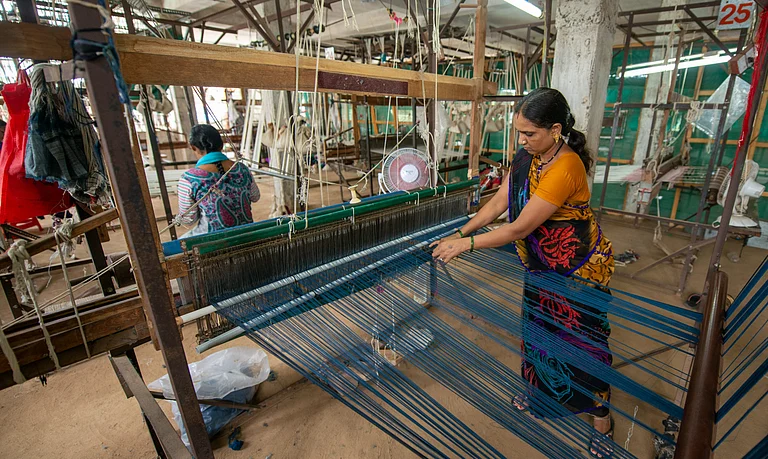The Credit Guarantee Fund for MSMEs has been enhanced. How will NSIC collaborate with financial institutions to ensure MSMEs benefit from this increased credit availability?
The enhancement of guarantee cover from the present ₹5 crore to ₹10 crore is in sync with the enhancement of ceiling limits defining the MSME status of enterprises. While the threshold investment criteria have been doubled, the threshold turnover criteria have been enhanced by 2.5 times. These revisions are expected to bring in more economy of scale, contribute to National Manufacturing Mission and drive vertical growth within the MSME sector.
NSIC has been playing the role of a facilitator in establishing bank linkages for MSME units for a long time. It has formal MoUs with several banks for generating and forwarding credit-worthy proposals for sanction of credit facilities by these banks. NSIC helps MSME units in the entire credit-application process including structuring of their loan application and advising effective management of finance.
Through these collaborative efforts, NSIC is helping to bridge the gap between financial institutions and MSMEs, making it easier for small enterprises to access the funds they need for growth and development.
A new scheme offers term loans up to ₹2 crore to 5 lakh first-time entrepreneurs from women, SCs and STs over the next five years. How will NSIC facilitate these entrepreneurs in establishing and scaling their businesses?
NSIC, through its livelihood business incubators, technology and skilling centres has been imparting necessary skill training amongst aspiring entrepreneurs. Not only do these 'enterprise-creation labs' impart skill trainings, they also provide the necessary handholding in terms of project-report preparation, guiding on enterprise formation, submission of structured loan proposals to the banks.
This new scheme for offering term loan to target groups will be leveraged to help boost self-employment for NSIC-trained candidates who want to set up new small business enterprises. Once an enterprise is established, the unit can also avail other NSIC support services for their growth.
Many small businesses want to join the digital selling platforms. How are you helping such businesses in this transition?
We have a dedicated portal www.msmemart.com, a B2B portal providing online marketing support to MSMEs. This platform increases visibility, discoverability and connects buyers with suppliers.
We offer digital services through leading providers to help MSMEs automate processes, reduce costs and enhance capacity. The MSME ministry offers up to 75% financial assistance—with a cap of ₹25,000—for micro enterprises adopting e-commerce platforms under Procurement and Marketing Support Scheme.
For all SC/ST micro and small entrepreneurs a subsidy of 80% is being provided on annual membership fees of the portal.
In order to catalyse onboarding of MSMEs over the digital commerce platforms, the Union Minister of MSMEs [Jitan Ram Manjhi], had launched the Trade Enablement and Marketing Initiative, which aims at empowering MSMEs to access new markets, expand their customer base and boost income via the government's backed Open Network for Digital Commerce platform.
NSIC is the implementing agency for the initiative, which has a target of 5 lakh beneficiaries.
We are in the process of introducing an AI-based solution for MSMEs to create digital catalogues quickly and cost-effectively, improving product discovery. We also intend to upscale and create ODOP [one district one product]-like services highlighting and creating hub for district- and state-specific products.
The main objective of SRI Fund is to provide equity funding support to the Daughter Funds for onward provision to MSMEs as growth capital
What is your assessment of Indian small business’ readiness to comply with green standards, such as, the European Union’s Corporate Sustainability Reporting Directive (CSRD)?
India has successfully reduced its carbon intensity by 33% between 2005 and 2019, achieving the target 11 years in advance. India has reset a target to reduce carbon intensity of its economy by 45% by 2030.India has also set an ambitious goal of achieving net-zero emission by 2070.
EU’s recent regulation on ESG reporting and the CSRD may have implications for Indian companies with subsidiaries or operations within the EU. Currently, several Indian companies disclose sustainability information using globally recognised standards like the Global Reporting Initiative and the Business Responsibility and Sustainability Reporting regulation issued by the Securities and Exchange Board of India [Sebi].
However, these companies must comply with CSRD that begins next year, necessitating immediate preparations. It is extremely important for Indian MSMEs which are part of the global supply chain to be compliant with such global standards and prepare accordingly.
Can you please elaborate on Self-Reliant India Fund for MSMEs?
The SRI Fund was launched as the first scheme of NSIC Venture Capital Fund, a 100% subsidiary of the NSIC. It employs a fund-of-fund investment strategy wherein the fund invests in Sebi registered, Category I and Category II Alternative Investment Funds, which in turn invest in MSMEs.
SRI Fund has a Mother Fund/Daughter Fund structure with a corpus of ₹10,000 crore as Mother Fund with the Union government being the anchor investor. The Daughter Funds are required to invest at least five times the amount of capital contribution received from SRI Fund, net of fees and expenses, in MSMEs, designated as such as per the MSMED Act.
The main objective of SRI Fund is to provide equity funding support to the Daughter Funds for onward provision to MSMEs as growth capital.
How is NSIC working with businesses and policymakers to ensure affordable access to eco-friendly materials?
The availability of raw materials for MSMEs has always been a challenge. Whether in terms of cost, availability, quantity and quality, the MSMEs often remain at the receiving end. NSIC, has been consistently working both on the demand and supply sides to alleviate the problems of quantity, quality, price and availability [of raw materials].
This has an impact on both the input and input costs thereby contributing to the quality and competitiveness of the finished product from MSMEs.












